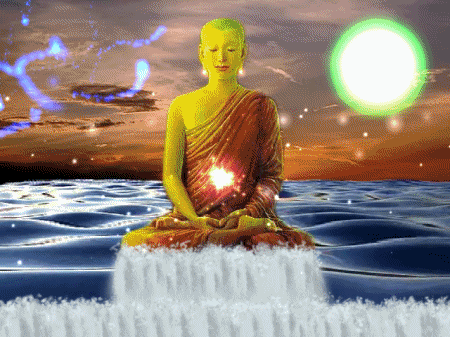Sunsets are viewed with wonder
Sunsets, like childhood, are viewed with wonder not just because they are beautiful but because they are fleeting. ~Richard Paul Evans

Sunsets, like childhood, are viewed with wonder not just because they are beautiful but because they are fleeting. ~Richard Paul Evans


by Venerable Ajahn Chah
When it comes to the Dhamma, we have to understand that our opinions are one thing; the Dhamma is something else.
As for the practice, start out by establishing your powers of endurance and then contemplate. Contemplate your activities, your comings and goings. Contemplate what you’re up to. Whatever arises, the Buddha has us know all around. Whatever direction things come in from, he has us know all around. If we know all around, whatever comes at us from this way, we see it. Whatever comes at us from that way, we see it. Right we know. Wrong we know. Happy we know. Glad we know. We know all around.
But our minds, when they contemplate, aren’t yet all around. We know just this side but leave that side wide open. It’s like putting a fence around a field or a house but it doesn’t go all around. If we put it up just on this side, thieves will come in that side, the side that the fence hasn’t gone around. Why is that? We haven’t closed the gate. Our fence isn’t yet good. It’s normal that they’ll have to come through that opening. So we contemplate again, adding more fence, closing things off, continually.
Putting up a fence means establishing mindfulness and always being alert. If we do this, the Dhamma won’t go anywhere else. It’ll come right here. Good and bad, the Dhamma we should see and should know, will arise right here.
As for whatever we don’t need to know, we let it go for the time being. We don’t waste our time with the logs we aren’t yet strong enough to lift. Wait until we have a tractor or a ten-wheel truck before trying to move them. Focus for the time being just on the things you can lift. Keep at it, using your powers of endurance, bit by bit.
If you stick with this steadily, your happy moods and sad moods, your desirable moods and undesirable moods, will all come in right there. That’s when you get to watch them.
Your moods and preoccupations are one thing; the mind is something else. They’re two different kinds of things. Usually when a mood hits, one that we like, we go running after it. If it’s one we don’t like, we turn our backs on it. When this is the case, we don’t see our own mind. We just keep running after our moods. The mood is the mood; the mind is the mind. You have to separate them out to see what the mind is like, what the mood is like. Continue reading
Verse 28: The wise one dispels negligence by means of mindfulness; he ascends the tower of wisdom and being free from sorrow looks at the sorrowing beings. Just as one on the mountain top looks at those on the plain below, so also, the wise one (the arahat) looks at the foolish and the ignorant (worldlings).
1. dhiro: the wise one; in this context, the arahat.
2. bile: the foolish; in this context, the worldings.
The Story of Thera Mahakassapa
While residing at the Jetavana monastery, the Buddha uttered Verse (28) of this book, with reference to Thera Mahakassapa.
On one occasion, while Thera Mahakassapa was staying at Pipphali cave, he spent his time developing the mental image of light (aloka kasina) and trying to find out through Divine Vision, beings who were mindful and beings who were negligent, also those who were about to die and those who were about to be born.
From his monastery, the Buddha saw through his Divine Vision what Thera Mahakassapa was doing and wanted to warn him that he was wasting his time. So he sent forth his radiance and appeared seated before the thera and exhorted him thus: “My son Kassapa, the number of births and deaths of beings is innumerable and cannot be counted. It is not your concern to count them; it is the concern only of the Buddhas.”
Then the Buddha spoke in verse as follows:
Verse 28. The wise one dispels negligence by means of mindfulness; he ascends the pinnacle of wisdom and being free from sorrow looks at the sorrowing beings. Just as one on the mountain top looks at those on the plain below, so also, the wise one (the arahat) looks at the foolish and the ignorant (worldlings).
Dhammapada Verse 28
Mahakassapatthera Vatthu
Pamadam appamadena
yada nudati pandito
pannapasadamaruyha
asoko sokinim pajam
pabbatatthova bhumatthe
dhiro1 bale2 avekkhati.
Source: Tipitaka
True happiness is…to enjoy the present, without anxious dependence upon the future. ~Seneca

Many persons have a wrong idea of what constitutes true happiness. It is not attained through self-gratification but through fidelity to a worthy purpose. ~Helen Keller

Photo credit: Randy Neufeldt
Every morning we are born again. What we do today is what matters most. ~ Gautama Buddha

No matter who tells you to be unkind,
do not fall for their words… ~Jendhamuni

If we do not turn inwards and train our mind, but instead expend all our energy on arranging and rearranging the external aspects of our existence, then our suffering will continue. ~ Lama Zopa Rinpoch


Verse 26: The foolish and the ignorant give themselves over to negligence; whereas the wise treasure mindfulness as a precious jewel.
Verse 27: Therefore, one should not be negligent, nor be addicted to sensual pleasures; for he who is established in mindfulness, through cultivation of Tranquillity and Insight Development Practice, experiences supreme happiness (i.e., realizes Nibbana).
1. bala dummedhino jana: the foolish and the ignorant. The foolish mentioned in the story were the hooligans who were given up to wild revelry and disorder during the Balanakkhatta festival. They were not mindful of others or of the consequence for themselves in this world and the next.
The Story of Balanakkhatta Festival
White residing at the Jetavana monastery, the Buddha uttered Verses (26) and (27) of this book, in connection with the Balanakkhatta festival.
At one time, the Balanakkhatta festival was being celebrated in Savatthi. During the festival, many foolish young men smearing themselves with ashes and cow-dung roamed about the city shouting and making themselves a nuisance to the public. They would also stop at the doors of others and leave only when given some money.
At that time there were a great many lay disciples of the Buddha, living in Savatthi. On account of these foolish young hooligans, they sent word to the Buddha, requesting him to keep to the monastery and not to enter the city for seven days. They sent alms-food to the monastery and they themselves kept to their own houses. On the eighth day, when the festival was over, the Buddha and his disciples were invited into the city for alms-food and other offerings. On being told about the vulgar and shameful behaviour of the foolish young men during the festival, the Buddha commented that it was in the nature of the foolish and the ignorant to behave shamelessly.
Then the Buddha spoke in verse as follows:
Verse 26: The foolish and the ignorant give themselves over to negligence; whereas the wise treasure mindfulness as a precious jewel.
Verse 27: Therefore, one should not be negligent, nor be addicted to sensual pleasures; for he who is established in mindfulness, through cultivation of Tranquillity and Insight Development Practice, experiences supreme happiness (i.e., realizes Nibbana).
Dhammapada Verses 26 and 27
Balanakkhattasanghuttha Vatthu
Pamadamanuyu janti
bala dummedhino jana1
appamadaca medhavi
dhanam setthamva rakkhati.
Ma pamadamanuyu jetha
ma kamaratisanthavam
appamatto hi jhayanto
pappoti vipulam sukham.
Source: Tipitaka